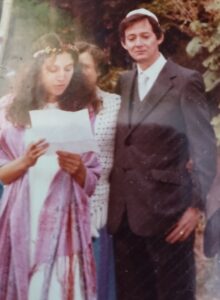Greetings from La-La Land! While the journey is just beginning, I figure I’ll be too busy to blog once the AWP conference gets in full swing tomorrow and I’m running around, oscillating between trying to learn some stuff, hear some inspiring writing, and chatting up the multitudes in a vague pretense of being an extrovert. The jury’s out on how long it will take before I pack up and head for some peace and quiet in the Emily Dickinson Room. Even today, I’ve got a meeting with my fiction editor coming up soon and an off-site reading I’m participating tonight co-organized by the editor of my poetry press, whom I’m also looking forward to meeting (7 pm at the Lilly Rose in case anyone’s in town). But in the meantime I’m enjoying some down time at the LA Central Library–a good tip on where to go from my cousin Steve, whom I just met for the first time this morning.
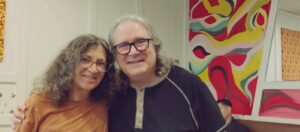
Cousin Steve
Steve is from the side of my family I barely knew, but heavily mythologized: the seven siblings of my grandmother’s generation (also known as the Glicksteins) who hosted musical concerts every Sunday in their small Newark apartment in the early 20th century: Dave on trumpet and Max on violin joined their father Abe in klezmer trios, which they also offered throughout the area for weddings and bar mitzvahs. Jeanne and Leona played the piano, Myra sang, and the two little ones, Sylvia and Harvey, banged their cymbals together when their father gave the count.
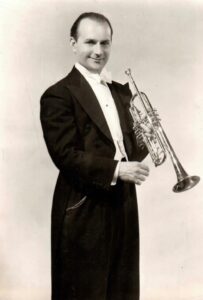
Dave Glickstein
Steve is the grandson of Dave, who played both trumpet and piano. At 12, Dave developed a performance shtick of playing both instruments at the same time. In his 80s, beset by deep dementia, he wasn’t sure who anyone was, but he could still sit down and play the Tchaikovsky Piano Concerto flawlessly and beautifully from memory. My grandmother, Jeanne, played and taught piano and recorder, and ran music camps for children and adults. She never achieved the accolades of her brothers Dave and Max, who both played for professional orchestras, but like them, she was determined to bring the joy of music to those who sought it.
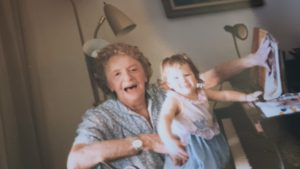
Two pianists: Grandma Jeanne with my daughter Alana when she was baby.
Not surprisingly, Steve is also a musician, despite many of this older generation’s warning to those that followed to give up on music and choose a career that was more dependable. And whether or not we’ve followed the advice in choosing our livelihoods, it’s rare to find a Glickstein cousin who doesn’t play something, even if only for the joy of it.
So, I’m thinking about this today while in LA, a place that so many people go to in pursuit of a dream. I’m way too realistic to think a chance meeting at the AWP will spark any of my unfulfilled dreams, no matter how far I can turn the extrovert faucet. But it’s still important to pursue what you love, to realize your art matters, that the process of making it makes you a better person, and hopefully touches at least some of those who are exposed to it.
Subscribe at https://ddinafriedman.substack.com

 This morning, I’ve taken another step in returning to normalcy, writing with some of my favorite pals in the Forbes Library Zoom Group, where my friend and colleague,
This morning, I’ve taken another step in returning to normalcy, writing with some of my favorite pals in the Forbes Library Zoom Group, where my friend and colleague, 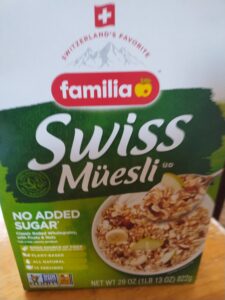 So, I’m grateful for routines, but also glad, that unlike my father, I’m more comfortable flitting in and out of them as needed. And once my latest batch of homemade granola is depleted, I’ll enjoy switching my breakfast routine to the several boxes of unopened muesli I brought home from New York, so I can keep remembering my father, whether or not I make it to the computer right afterwards.
So, I’m grateful for routines, but also glad, that unlike my father, I’m more comfortable flitting in and out of them as needed. And once my latest batch of homemade granola is depleted, I’ll enjoy switching my breakfast routine to the several boxes of unopened muesli I brought home from New York, so I can keep remembering my father, whether or not I make it to the computer right afterwards.